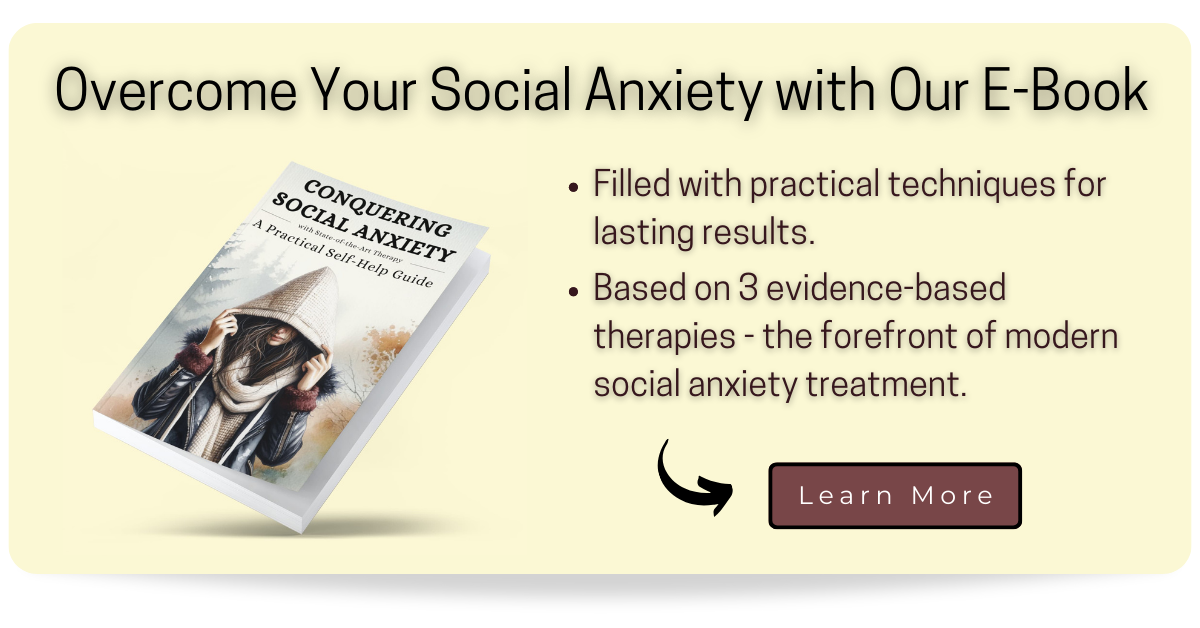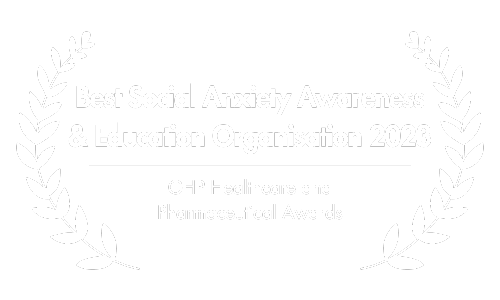Interpersonal Therapy for Social Anxiety: A Helpful Introductory Guide
This article includes a recommendation for an online therapy service that helps with social anxiety. By using our link, you will receive a significant discount and we will earn a commission.
In a world where social interactions are an integral part of daily life, the weight of social anxiety can be overwhelming.
The apprehension of judgment, the fear of rejection, and the unease in social situations can become paralyzing for those who grapple with social anxiety disorder.

While the digital age has transformed the way we connect, it has also given rise to new forms of social anxiety, making it even more crucial to find effective therapeutic approaches.
Enter Interpersonal Therapy (IPT), a modality that shines a light on the intricate relationship between our personal psychology and the complex web of our interpersonal connections.
Unlike other therapeutic approaches that focus solely on individual cognitive processes, IPT takes a unique and holistic stance by considering the impact of relationships, communication patterns, and social roles on one’s emotional well-being.

This article delves into the realm of interpersonal therapy as a potent tool in the treatment of social anxiety.
We’ll explore how IPT operates, its underlying principles, and the ways in which it empowers individuals to navigate the challenges of social anxiety by enhancing their interpersonal skills and fostering meaningful connections.
Join us as we uncover how IPT can potentially offer a pathway towards not just alleviating social anxiety, but also towards building a richer, more fulfilling social life.

A. Social Anxiety: A Brief Explanation
Social anxiety, often referred to as social phobia, is a pervasive mental health condition that exerts a profound impact on those who experience it.
While it’s normal to feel nervous or self-conscious in certain social situations, social anxiety takes these feelings to an extreme level.
Individuals grappling with social anxiety encounter overwhelming distress when faced with scenarios that involve interaction with others.

The prospect of judgment, criticism, and embarrassment becomes a source of intense fear, sometimes leading to avoidance behaviors as a coping mechanism (American Psychiatric Association, 2013).
The symptoms of social anxiety can manifest in a variety of ways. Physical responses such as rapid heartbeat, trembling, sweating, and nausea often accompany the emotional distress.
The emotional toll is equally significant, with individuals experiencing a sense of dread, apprehension, and a persistent worry about being negatively evaluated by others.
B. Introduction to Interpersonal Therapy
In the realm of therapeutic interventions for social anxiety, interpersonal therapy (IPT) represents a promising avenue.
IPT is a structured and time-limited psychotherapy that centers around the impact of relationships and interpersonal interactions on an individual’s emotional well-being.
Unlike other therapeutic modalities, IPT doesn’t delve into an individual’s childhood experiences or focus extensively on the workings of the mind.

Instead, it squarely addresses the influence of relationships, life transitions, and social interactions on emotional health.
The underlying philosophy of IPT rests on the idea that our connections with others profoundly shape our emotions and mental state.
It recognizes that disruptions in interpersonal relationships can lead to emotional distress, and conversely, improving these relationships can alleviate psychological symptoms.
IPT is collaborative in nature, with both the therapist and the individual working together to identify problematic relationship patterns and communication styles.
By gaining insights into how one interacts with others and the emotional impact of these interactions, individuals can develop healthier ways of relating and coping.

C. How Interpersonal Therapy Works
Central to the success of IPT is its structured approach. The therapy is typically divided into distinct phases, each with a specific focus.
- Assessment Phase: In this initial phase, the therapist conducts a comprehensive assessment to understand the individual’s social anxiety, interpersonal dynamics, and specific challenges. Together, they identify the key areas where interpersonal difficulties contribute to emotional distress.
- Main Intervention Phase: Once the problematic areas are identified, the therapy moves into its main intervention phase. Here, the therapist and the individual collaborate to explore and address these interpersonal challenges. The therapy may involve role-playing, communication skill-building, and examining patterns of behavior that contribute to social anxiety.
- Termination Phase: As the therapy progresses, the focus shifts towards consolidating the skills and insights gained during the intervention phase. The individual and therapist work together to develop strategies for maintaining progress and handling future challenges independently.

Interpersonal therapy’s approach is particularly beneficial for individuals with social anxiety because it directly addresses the core concerns of social interactions and relationships.
By learning effective communication, assertiveness, and conflict resolution skills, individuals can reduce social anxiety and enhance their emotional well-being.
D. Typical Interpersonal Problems in Individuals with Social Anxiety
Social anxiety often brings with it a set of distinct interpersonal challenges that can significantly impact an individual’s relationships and overall well-being.
These challenges stem from the profound fear of judgment, criticism, and negative evaluation by others.
IPT recognizes these struggles and offers a targeted approach to address them, fostering healthier interactions and improved emotional well-being.

Avoidance and Isolation
People with social anxiety tend to avoid situations that trigger their anxiety, which can lead to isolation and a limited social life.
IPT acknowledges this avoidance pattern and aims to break the cycle by gradually exposing individuals to feared social situations in a supportive therapeutic environment.
Over time, this exposure can reduce the intensity of anxiety and help individuals regain a sense of normalcy in their social interactions.

Excessive Self-Focus
Socially anxious individuals often find themselves excessively preoccupied with their own thoughts, worrying about how they appear to others and fearing that their actions will be scrutinized.
IPT encourages a shift from self-focused attention to outward awareness.
Therapists guide individuals to focus on understanding the perspectives and emotions of others in social situations, thereby reducing self-consciousness.

Negative Self-Evaluation
Individuals with social anxiety frequently engage in negative self-evaluation, assuming that others perceive them negatively.
This can erode self-esteem and hinder the development of meaningful connections.
IPT helps individuals challenge and reframe these negative self-perceptions by exploring evidence that contradicts these beliefs.
By fostering a more balanced view of themselves, individuals can approach social interactions with increased confidence.

Communication Difficulties
Socially anxious individuals may struggle with effective communication, often fearing judgment or criticism for what they say.
IPT provides a safe space to practice assertive communication skills, helping individuals express their thoughts and feelings more confidently while navigating potential social challenges.
Dependency on Reassurance
Seeking constant reassurance from others is a common behavior in individuals with social anxiety.
IPT helps individuals recognize this pattern and gradually reduce their reliance on external validation.

By focusing on internal validation and building self-acceptance, individuals can develop a stronger sense of self-worth.
Interpersonal Conflict Avoidance
Avoiding conflicts to prevent uncomfortable interactions is a common strategy for socially anxious individuals.
However, this avoidance can hinder healthy communication and resolution.
IPT equips individuals with conflict resolution skills, empowering them to address conflicts in a constructive manner and strengthening their interpersonal relationships.
Interpersonal Therapy recognizes that addressing these typical interpersonal challenges is crucial for alleviating social anxiety.
Through structured sessions, role-playing, and skill-building exercises, individuals gradually learn to confront their fears, develop effective communication strategies, and cultivate more satisfying relationships.

E. IPT’s Effectiveness for Social Anxiety
The effectiveness of interpersonal therapy in treating social anxiety is supported by a growing body of scientific research:
- A study comparing residential cognitive therapy and residential interpersonal therapy for social phobia found both to be equally effective in reducing social anxiety symptoms, with improvements sustained up to a year post-treatment (Borge et al., 2008).
- In a comparison of 14-week individual sessions of IPT and supportive therapy for social anxiety disorder, both approaches showed significant symptom improvement (Lipsitz et al., 2008).
- One study found positive effects on symptoms in social anxiety in guided self-help treatment based on IPT (Dagöö et al., 2014)
- A randomized controlled trial contrasting cognitive therapy and IPT with a waiting-list control for SAD treatment demonstrated substantial improvements in both therapies (Stangier et al., 2011).
- Both interpersonal psychotherapy and cognitive behavioral therapy were found to be effective in treating social anxiety in college students (Hui, 2011).
- IPT was found to lead to significant reductions in social anxiety, and sudden gains observed during the course of IPT for social anxiety disorder were found to be predictive of long-term therapeutic outcomes (Bohn et al., 2013).
- Combining interpersonal relationship strategies from IPT with CBT for social anxiety improved social skills and relationships and reduced anxiety symptoms. – an indication of the potential of interpersonal therapy for social anxiety (Alden & Taylor, 2011).
- Another study showed the efficacy of cognitive and interpersonal psychotherapy in diminishing social anxiety, with specific cognitive and interpersonal factors driving improvements (Hoffart el a., 2009).

F. Benefits of IPT for Social Anxiety
Interpersonal Therapy offers distinct advantages for individuals struggling with social anxiety:
- Focused on Relationships: IPT acknowledges the profound influence of relationships on emotional well-being, providing individuals with tools to navigate social interactions effectively.
- Structured Approach: The structured nature of IPT guides individuals through a systematic process of identifying and addressing interpersonal challenges, providing a clear path towards improvement.
- Real-Life Relevance: IPT’s focus on real-life scenarios and communication patterns equips individuals with practical skills they can immediately apply to their daily interactions.
- Complementary to Other Approaches: While IPT has its unique approach, it can be used alongside other therapeutic methods, enhancing the overall effectiveness of treatment.

G. Insurance Coverage for IPT
One crucial aspect to consider when exploring interpersonal therapy is insurance coverage.
Many individuals rely on their insurance plans to help cover the costs of therapy, and it’s worth investigating whether IPT is covered under your specific plan.
Insurance coverage for mental health services, including therapy, varies widely. Some insurance plans cover a range of therapeutic approaches, while others may have limitations.

When considering IPT for social anxiety, take the following steps:
- Check Your Plan: Contact your insurance provider to inquire about coverage for interpersonal therapy. Ask about the specific therapies covered, any requirements or documentation needed, and any associated costs or copayments.
- Discuss with Therapists: If you’re considering a specific therapist or online platform, discuss insurance coverage with them. They can provide insights into whether they accept your insurance and guide you through the process.
- Explore Alternatives: If your insurance plan doesn’t cover IPT, explore alternative options. Some therapists offer sliding-scale fees or payment plans to make therapy more accessible.
Remember that the availability of insurance coverage can influence your decision-making process, so it’s important to gather accurate information and make an informed choice.

H. Recommendation for Online IPT
In today’s digital age, access to effective therapies has expanded through online platforms.
If you’re considering interpersonal therapy for your social anxiety, a notable option is BetterHelp. While there are other reputable online therapy providers, this one works with qualified IPT therapists.
The platform offers a user-friendly interface and a diverse range of therapists to choose from. The flexibility of remote sessions, whether through messaging, live chat, phone calls, or video sessions, accommodates those who experience anxiety in face-to-face settings.

With BetterHelp, you pay monthly, get one live session per week and unlimited chat contact with your therapist – and you can get started in no time.
Click the link below to get started, and you’ll be prompted to provide insights into your current situation and therapist preferences. This step enables you to tailor the selection process to match your specific therapy needs, allowing you to choose IPT as your preferred choice.

I. Conclusion
In your journey to overcome social anxiety, interpersonal therapy offers a silver lining.
Rooted in the understanding of the powerful influence of relationships, IPT offers a structured and practical approach to enhancing social interactions and emotional well-being.
The scientific evidence supporting IPT’s effectiveness, along with the convenience of accessing it through online platforms like BetterHelp, makes it a promising option for those seeking relief from the burdens of social anxiety.
As you explore your therapeutic path, consider the transformative potential of interpersonal therapy to empower you on your journey toward a more fulfilling and anxiety-free life.

If you’re eager to embark on a journey of exploration through diverse therapeutic avenues to address social anxiety, we invite you to discover our comprehensive therapy guide by clicking right here.
Furthermore, if you’re seeking a comprehensive overview that spans therapy, medication, and self-help approaches, you’re welcome to dive into our in-depth guide available here.
In addition, we have created a comprehensive guide to pharmacotherapy for social phobia. If you are interested in medication approaches, just click here.
Still have lingering questions? Take a step toward clarity and empowerment by enrolling in our Free 7-day Email Course. We’re dedicated to being your guide on this journey of understanding and growth.

Alden, L. E., & Taylor, C. T. (2011). Relational treatment strategies increase social approach behaviors in patients with Generalized Social Anxiety Disorder. Journal of Anxiety Disorders, 25(3), 309-318.
American Psychiatric Association. (2013). Diagnostic and statistical manual of mental disorders (5th ed.). Washington, DC: Author.
Bohn, C., Aderka, I. M., Schreiber, F., Stangier, U., & Hofmann, S. G. (2013). Sudden gains in cognitive therapy and interpersonal therapy for social anxiety disorder. Journal of Consulting and Clinical Psychology, 81(1), 177-182.
Borge, F. M., Hoffart, A., Sexton, H., Clark, D. M., Markowitz, J. C., & McManus, F. (2008). Residential cognitive therapy versus residential interpersonal therapy for social phobia: a randomized clinical trial. Journal of anxiety disorders, 22(6), 991–1010. https://doi.org/10.1016/j.janxdis.2007.10.002
Dagöö, J., Asplund, R. P., Bsenko, H. A., Hjerling, S., Holmberg, A., Westh, S., Öberg, L., Ljótsson, B., Carlbring, P., Furmark, T., & Andersson, G. (2014). Cognitive behavior therapy versus interpersonal psychotherapy for social anxiety disorder delivered via smartphone and computer: A randomized controlled trial. Journal of Anxiety Disorders, 28(4), 410-417.
Hoffart, A., Borge, F. M., Sexton, H., & Clark, D. M. (2009). Change processes in residential cognitive and interpersonal psychotherapy for social phobia: a process-outcome study. Behavior therapy, 40(1), 10–22. https://doi.org/10.1016/j.beth.2007.12.003
Hui, H. (2011). Effects of group interpersonal psychotherapy and group cognitive behavioral therapy on social anxiety in college students. Chinese Mental Health Journal, 25(8), 601-606.
Lipsitz, J. D., Gur, M., Vermes, D., Petkova, E., Cheng, J., Miller, N., Laino, J., Liebowitz, M. R., & Fyer, A. J. (2008). A randomized trial of interpersonal therapy versus supportive therapy for social anxiety disorder. Depression and anxiety, 25(6), 542–553. https://doi.org/10.1002/da.20364
Stangier, U., Schramm, E., Heidenreich, T., Berger, M., & Clark, D. M. (2011). Cognitive therapy vs interpersonal psychotherapy in social anxiety disorder: a randomized controlled trial. Archives of general psychiatry, 68(7), 692–700. https://doi.org/10.1001/archgenpsychiatry.2011.67

About the Author: Martin Stork
Martin is a professional psychologist with a background in physical therapy. He has organized and led various support groups for people with social anxiety in Washington, DC and Buenos Aires, Argentina. He is the founder of Conquer Social Anxiety Ltd, where he operates as a writer, therapist and director. You can click here to find out more about Martin.











